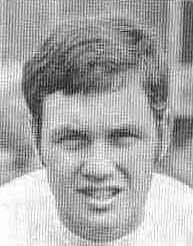 |
 |
 |
 |
 |
 |
 |
 |
 |
 |
 |
Players
James 'Sean' O'Neill (full-back) 1967-74
Though a versatile and dependable performer in reserve fixtures and often
praised for his 'O’Neill Shuffle'— a trick of wrong-footing opponents
with subtle footwork — his first-team opportunities at Leeds were extremely
limited. O’Neill made just one league appearance, coming on as a substitute
in a 1–1 draw against Newcastle United on 2 March 1974. He also made two
European Cup substitute outings: one replacing Paul Reaney on 3 October
1973 and another replacing Frank Gray three weeks later against Hibernian. Across the seven seasons from 1967 to 1974, O’Neill remained a consistent
Central League player and reserve team utility figure, filling various
roles across full-back, midfield, and even forward when needed. Despite
his adaptability and professionalism, he was largely blocked from regular
first-team action by Leeds’ dominance during the Revie era. That Leeds side in the late 1960s and early 1970s was arguably one of
England’s strongest ever, progressing regularly in domestic and European
competitions, and at times fielding squads revered across Europe. For
a young full-back like O’Neill, breakthrough chances were few in a side
packed with international stars. With none of that outstanding depth available to him, O’Neill accepted
a free transfer to Chesterfield in July 1974, following many contemporaries
including Trevor Cherry. That move was initiated under manager Joe Shaw
and transformed O’Neill’s career, where he went on to become one of Chesterfield’s
most durable servants — making over 430 league starts and five substitute
appearances, scoring six goals over 12 seasons. He even helped Chesterfield
capture the Anglo-Scottish Cup in 1981 and the Fourth Division title in
1984/85, before retiring in 1986. Sean
O’Neill was born in Belfast on 24 February 1952, and relocated to England
as a teenager to join Leeds United’s youth ranks. Signed in 1967, he signed
professional terms and entered one of the strongest squads in English
football history under manager Don Revie, competing for places against
legends like Paul Reaney and Terry Cooper at full-back and cover positions.
Sean
O’Neill was born in Belfast on 24 February 1952, and relocated to England
as a teenager to join Leeds United’s youth ranks. Signed in 1967, he signed
professional terms and entered one of the strongest squads in English
football history under manager Don Revie, competing for places against
legends like Paul Reaney and Terry Cooper at full-back and cover positions.